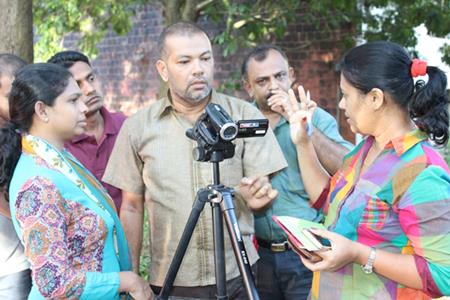Educational Media Focus
.jpg)
What We Do: CEMCA works in two major sectors: Education and Skills. In both these sectors, the main focus is on the use of appropriate educational communication technologies to improve the quality of teaching and learning. CEMCA has been engaged in the promotion of low-cost open source technologies for promoting online learning in the Asian region. While it is not a technology organization, it is engaged in experimenting with learning technologies to showcase the benefits and guide others on how to use technology for learning. CEMCA has promoted the following:
- Educational Multimedia
- eLearning
- Radio Enabled Learning
- Open Educational Resources
- Community Radio
- Television
- Webinar
- Online learning
- MOOC
 How We Do: CEMCA’s engagement in both the sectors of education and Skills are based on the needs of the stakeholders in the region. Though constant engagement with the Governments, stakeholders meetings, and interaction with heads of institutions, teachers and students, CEMCA prioritizes its initiatives and activities. Most of its activities results in direct benefits to institutional development, and also provide capacity building to individuals in institutions. CEMCA’s activities are grounded on the principles of Results Based Management (RBM), and therefore, focusses on outputs and outcomes. Initiatives and activities are planned in a three year cycle, and interventions are designed to achieve measurable outputs (in a year) and outcomes (in the three year programme cycle). Most activities are implemented in partnership with local institutions, and therefore CEMCA’s role is mostly catalytic in nature. In the livelihood and health sector, CEMCA uses community radio as the main medium to promote development, and therefore, it’s interventions in this sector are geared towards the use of community radio. As we understand that institutional change and development of meaningful results come from long-term engagements with the stakeholders, we work closely with the grassroots level institutions to hand-hold them and work with them side-by-side. We provide policy advice to governments and institutions to promote the use of open, distance and online learning for development.
How We Do: CEMCA’s engagement in both the sectors of education and Skills are based on the needs of the stakeholders in the region. Though constant engagement with the Governments, stakeholders meetings, and interaction with heads of institutions, teachers and students, CEMCA prioritizes its initiatives and activities. Most of its activities results in direct benefits to institutional development, and also provide capacity building to individuals in institutions. CEMCA’s activities are grounded on the principles of Results Based Management (RBM), and therefore, focusses on outputs and outcomes. Initiatives and activities are planned in a three year cycle, and interventions are designed to achieve measurable outputs (in a year) and outcomes (in the three year programme cycle). Most activities are implemented in partnership with local institutions, and therefore CEMCA’s role is mostly catalytic in nature. In the livelihood and health sector, CEMCA uses community radio as the main medium to promote development, and therefore, it’s interventions in this sector are geared towards the use of community radio. As we understand that institutional change and development of meaningful results come from long-term engagements with the stakeholders, we work closely with the grassroots level institutions to hand-hold them and work with them side-by-side. We provide policy advice to governments and institutions to promote the use of open, distance and online learning for development.

